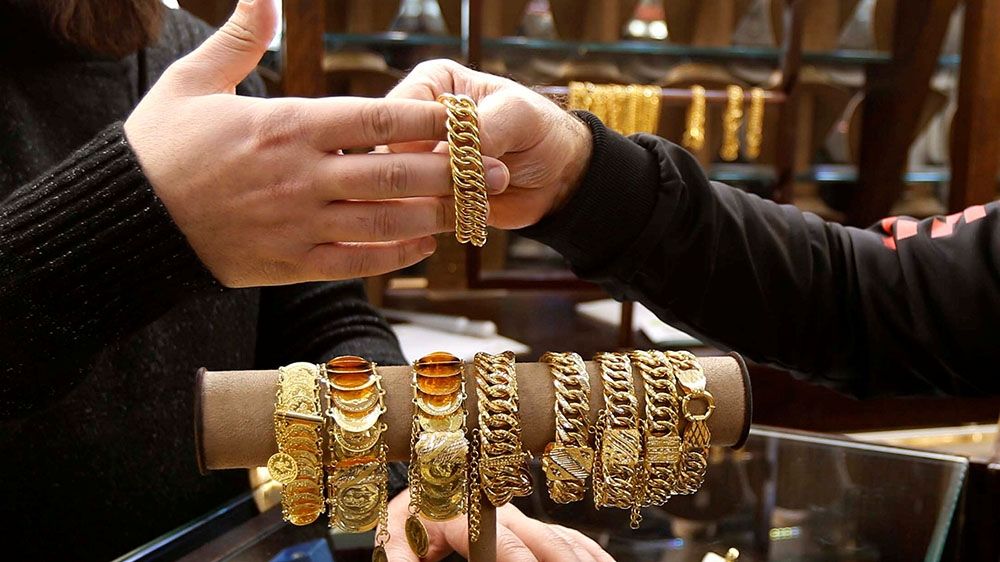Lebanese splurging on luxury items after banks imposed cash withdrawal limits – Here is what you need to know

A few minutes every morning is all you need.
Stay up to date on the world's Headlines and Human Stories. It's fun, it's factual, it's fluff-free.
More and more Lebanese are converting their cash savings into luxury goods such as gold and jewelry after banks in Lebanon imposed cash withdrawal limits. According to a report by Reuters, many Lebanese fear that more drastic financial restrictions are to come thanks to imposed capital controls.
Upon hearing news of the cash withdrawal limit, one Lebanese woman rushed out to buy a $10,000 Rolex watch on her credit card. “It’s better than keeping my money in the bank,” she said.
In another case, a woman and her daughter gathered all their cash and purchased $50,000 worth of gold that they then hid at their home.
Meanwhile, in Beirut, several jewelry stores reported customers rushing in to buy gold and diamonds that could be easily sold abroad. Like many businesses, most jewelers now accept only cash.
According to an employee at a Rolex store in the city, purchases can only be made if half the payment is in US dollars, as reported by Reuters.
US dollar shortage
In November 2019, it was reported that a shortage of US dollars has caused several businesses to close and many people to lose their jobs.
The official rate of the Lebanese pound (also known as the Lebanese lira) is pegged at 1,507 to the US dollar, a rate which has been set since 1997.
But Lebanese don’t rely on their local currency, preferring to use US dollars instead. The US dollar is used for many transactions in Lebanon, such as rent.
However, with US dollars in short supply, citizens are scrambling to come up with alternatives.
“I’m going to move from my apartment because the owner is insisting on taking the rent in dollars, and I’m not willing to pay it because this will mean that my rent will increase approximately 30-35%,” a Lebanese man told Al-Jazeera.
Since protests began in Lebanon in October 2019, currency dealers have refused to sell at the set rate previously agreed upon with the central bank. This has dramatically increased the price of the US dollar, with the exchange rate sometimes hitting as high as 2,500 pounds to the dollar.
[article_ad]
A cap at 2,000 Lebanese pounds per dollar
The Lebanese Money Changers Association said it had agreed with the central bank on “an exchange rate for the US dollar capped at 2,000 Lebanese pounds," effective January 22.
However, dealers said the price control would force the market to go underground, which would result in transactions being made outside of officially designated exchange bureaus. “It is going to create a third market, a parallel market to the parallel market. It is not very realistic,” said a dealer.
Reuters had reported that many currency bureaus were running out of US dollars to sell and were willing to purchase dollars at the new price of 2,000 Lebanese pounds.
The Lebanese pound has lost over one-third of its value against the dollar in the parallel market.
Banks cash withdrawal limits
Since November 2019, in an attempt to preserve liquidity, banks in Lebanon have imposed a weekly limit on dollar withdrawals, with some set at less than $200.
Lebanon’s commercial banks have been told to limit weekly withdrawals from US dollar accounts to $1,000 in a set of temporary directives issued by Lebanon’s banking association in November.
Local banks have also blocked foreign money transfers. Previously, hard currency transfers were permitted abroad in order to cover urgent personal spending.
[article_ad]
Economic ‘rescue plan’ nowhere in sight
Newly-elected Finance Minister Ghazi Wazni plans to meet with IMF Alternate Executive Director Sami Geadah in the final week of January.
Wazni says that it will be a courtesy meeting with IMF delegates and won’t involve discussion of an emergency rescue plan.
Meanwhile, Lebanon’s former finance minister, Gebran Bassil, attended the World Economic Forum (WEF) in Davos as Lebanon’s representative where he was heavily criticized for representing Lebanon after having already lost his position as the head of the finance ministry.
Bassil defended his attendance by claiming that WEF organizers had insisted on his appearance at the summit.
“They insisted on this invitation. You too, you decided with the gentleman here organizing this debate on my presence," Bassil told CNBC’s senior international correspondent and Middle East anchor Hadley Gamble.
Gamble asked Bassil if he took a private plane to get to Davos. Bassil responded that there was “not one Lebanese lira on my expense. This (the money) was offered to me.”
When talking about the situation in Lebanon, Bassil attempted to explain that Lebanon is in crisis because of “wrong policies adopted since 30 years (sic)".
“The situation cannot be fixed by the same economic and financial policy adopted thirty years ago, and this is the priority, and every talk about quotas and a third is idle to us,” tweeted Bassil on January 15.
[article_ad]




Comments ()